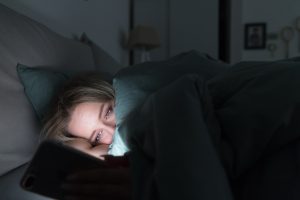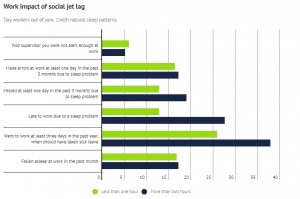New study reveals a third of Australians are affected
Most of us are guilty of staying on our phone, laptop or tablet late at night when we should be sleeping – but what damage is this really doing to our health?
According to a new study published in Science Medicine, a third of Australians experience jet-lag like symptoms, often associated with using smart devices before going to bed.
This has been labelled ‘social jet lag’, a term given when tiredness is caused by breaking a natural sleep pattern to wake up an hour or more earlier to meet social obligations (including travelling to work).
The study
The study funded by the Sleep Foundation of Australia surveyed 1,100 people across the nation and found a third were forced to wake up earlier in the mornings for social obligations such as work or study.
Many of those with jet-lag like symptoms also had a common connection as they used the internet or a smart device in the hour before going to sleep.
Robert Adams, a Professor of Medicine at the University of Adelaide and the study’s lead author, said those who were having problems with social jet lag were more often late for work.
“They reported that they probably went to work when they shouldn’t have but they tended to anyway,” Mr Adams said.
“They were sleepy in the mornings after unrefreshed sleep and were also sleepy during the day.”
The researchers behind the study suspect those who should’ve taken sick leave but still went to work did this because they were feeling under the weather from lack of sleep and couldn’t afford to take time off every time they felt unwell.
Source: The Sydney Morning Herald
How much is social jet lag affecting us?
According to the Sleep Health Foundation of Australia, there’s an impending sleep crisis across the nation and there needs to be action taken to address the growing problem.
Professor Dorothy Bruck, chairwoman of the Sleep Health Foundation, said sleep should be viewed as the third pillar of good health, alongside a healthy diet and physical activity.
“We now have a dire situation where millions of Australians are failing to get the sleep they need to live happy, healthy lives,” Professor Bruck said.
Common problems for those who suffer from lack of sleep include:
- Being late for work
- Not feeling alert enough to conduct their job correctly
- Making errors or mistakes on the job
- Falling asleep during working hours.






